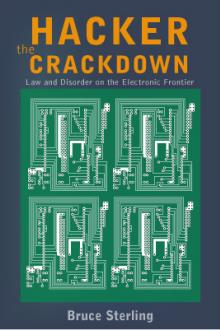The Jargon File by Eric S. Raymond (ebook reader android txt) 📕

- Author: Eric S. Raymond
- Performer: -
Book online «The Jargon File by Eric S. Raymond (ebook reader android txt) 📕». Author Eric S. Raymond
remains otherwise mysterious.
Node:whack-a-mole, Next:[14638]whacker, Previous:[14639]whack,
Up:[14640]= W =
whack-a-mole n.
[from the carnival game which involves quickly and repeatedly hitting
the heads of mechanical moles with a mallet as they pop up from their
holes.] 1. The practice of repeatedly causing spammers'
[14641]throwaway accounts and drop boxes to be terminated. 2. After
sense 1 became established in the mid-1990s the term passed into more
generalized use, and now is commonly found in such combinations as
`whack-a-mole windows'; the obnoxious pop-ip advertisement windows
spawned in flocks when you surg to sites like Geocities or Tripod.
Node:whacker, Next:[14642]whales, Previous:[14643]whack-a-mole,
Up:[14644]= W =
whacker n.
[University of Maryland: from [14645]hacker] 1. A person, similar to a
[14646]hacker, who enjoys exploring the details of programmable
systems and how to stretch their capabilities. Whereas a hacker tends
to produce great hacks, a whacker only ends up whacking the system or
program in question. Whackers are often quite egotistical and eager to
claim [14647]wizard status, regardless of the views of their peers. 2.
A person who is good at programming quickly, though rather poorly and
ineptly.
Node:whales, Next:[14648]whalesong, Previous:[14649]whacker,
Up:[14650]= W =
whales n.
See [14651]like kicking dead whales down the beach.
Node:whalesong, Next:[14652]What's a spline?, Previous:[14653]whales,
Up:[14654]= W =
whalesong n.
The peculiar clicking and whooshing sounds made by a PEP modem such as
the Telebit Trailblazer as it tries to synchronize with another PEP
modem for their special high-speed mode. This sound isn't anything
like the normal two-tone handshake between conventional V-series
modems and is instantly recognizable to anyone who has heard it more
than once. It sounds, in fact, very much like whale songs. This noise
is also called "the moose call" or "moose tones".
Node:What's a spline?, Next:[14655]wheel, Previous:[14656]whalesong,
Up:[14657]= W =
What's a spline?
[XEROX PARC] This phrase expands to: "You have just used a term that
I've heard for a year and a half, and I feel I should know, but don't.
My curiosity has finally overcome my guilt." The PARC lexicon adds
"Moral: don't hesitate to ask questions, even if they seem obvious."
Node:wheel, Next:[14658]wheel bit, Previous:[14659]What's a spline?,
Up:[14660]= W =
wheel n.
[from slang `big wheel' for a powerful person] A person who has an
active [14661]wheel bit. "We need to find a wheel to unwedge the hung
tape drives." (See [14662]wedged, sense 1.) The traditional name of
security group zero in [14663]BSD (to which the major system-internal
users like [14664]root belong) is `wheel'. Some vendors have expanded
on this usage, modifying Unix so that only members of group `wheel'
can [14665]go root.
Node:wheel bit, Next:[14666]wheel of reincarnation,
Previous:[14667]wheel, Up:[14668]= W =
wheel bit n.
A privilege bit that allows the possessor to perform some restricted
operation on a timesharing system, such as read or write any file on
the system regardless of protections, change or look at any address in
the running monitor, crash or reload the system, and kill or create
jobs and user accounts. The term was invented on the TENEX operating
system, and carried over to TOPS-20, XEROX-IFS, and others. The state
of being in a privileged logon is sometimes called `wheel mode'. This
term entered the Unix culture from TWENEX in the mid-1980s and has
been gaining popularity there (esp. at university sites). See also
[14669]root.
Node:wheel of reincarnation, Next:[14670]wheel wars,
Previous:[14671]wheel bit, Up:[14672]= W =
wheel of reincarnation
[coined in a paper by T. H. Myer and I.E. Sutherland "On the Design of
Display Processors", Comm. ACM, Vol. 11, no. 6, June 1968)] Term used
to refer to a well-known effect whereby function in a computing system
family is migrated out to special-purpose peripheral hardware for
speed, then the peripheral evolves toward more computing power as it
does its job, then somebody notices that it is inefficient to support
two asymmetrical processors in the architecture and folds the function
back into the main CPU, at which point the cycle begins again.
Several iterations of this cycle have been observed in
graphics-processor design, and at least one or two in communications
and floating-point processors. Also known as the Wheel of Life',the
Wheel of Samsara', and other variations of the basic Hindu/Buddhist
theological idea. See also [14673]blitter, [14674]bit bang.
Node:wheel wars, Next:[14675]White Book, Previous:[14676]wheel of
reincarnation, Up:[14677]= W =
wheel wars n.
[Stanford University] A period in [14678]larval stage during which
student hackers hassle each other by attempting to log each other out
of the system, delete each other's files, and otherwise wreak havoc,
usually at the expense of the lesser users.
Node:White Book, Next:[14679]whitelist, Previous:[14680]wheel wars,
Up:[14681]= W =
White Book n.
Syn. [14682]K&R. 2. Adobe's fourth book in the PostScript series,describing the previously-secret format of Type 1 fonts; "Adobe Type 1
Font Format, version 1.1", (Addison-Wesley, 1990, ISBN 0-201-57044-0).
See also [14683]Red Book, [14684]Green Book, [14685]Blue Book.
Node:whitelist, Next:[14686]whizzy, Previous:[14687]White Book,
Up:[14688]= W =
whitelist n.
The opposite of a blacklist. That is, instead of being an explicit
list of people who are banned, it's an explicit list of people who are
to be admitted. Hackers use this especially of lists of email
addresses that are explicitly enabled to get past strict anti-spam
filters.
Node:whizzy, Next:[14689]wibble, Previous:[14690]whitelist,
Up:[14691]= W =
whizzy adj.
(alt. `wizzy') [Sun] Describes a [14692]cuspy program; one that is
feature-rich and well presented.
Node:wibble, Next:[14693]WIBNI, Previous:[14694]whizzy, Up:[14695]= W
=
wibble
[UK, perh. originally from the first "Roger Irrelevant" strip in "VIZ"
comics, spread via "Your Sinclair magazine in the 1980s and early
1990s"] 1. n.,v. Commonly used to describe chatter, content-free
remarks or other essentially meaningless contributions to threads in
newsgroups. "Oh, rspence is wibbling again". 2. [UK IRC] An explicit
on-line no-op equivalent to [14696]humma. 3. One of the preferred
[14697]metasyntactic variables in the UK, forming a series with
wobble, wubble, and flob (attributed to the hilarious historical
comedy "Blackadder"). 4. A pronounciation of the letters "www", as
seen in URLs; i.e., www.[14698]foo.com may be pronounced "wibble dot
foo dot com" (compare [14699]dub dub dub).
The ancestral sense of this word is reported to have been "My brain is
packing it in now. I give up. Tilt! Tilt! Tilt!"
Node:WIBNI, Next:[14700]widget, Previous:[14701]wibble, Up:[14702]= W
=
WIBNI // n.
[Bell Labs: Wouldn't It Be Nice If] What most requirements documents
and specifications consist entirely of. Compare [14703]IWBNI.
Node:widget, Next:[14704]wiggles, Previous:[14705]WIBNI, Up:[14706]= W
=
widget n.
A meta-thing. Used to stand for a real object in didactic examples(especially database tutorials). Legend has it that the original
widgets were holders for buggy whips. "But suppose the parts list for
a widget has 52 entries...." 2. [poss. evoking `window gadget'] A user
interface object in [14707]X graphical user interfaces.
Node:wiggles, Next:[14708]WIMP environment, Previous:[14709]widget,
Up:[14710]= W =
wiggles n.
[scientific computation] In solving partial differential equations by
finite difference and similar methods, wiggles are sawtooth
(up-down-up-down) oscillations at the shortest wavelength
representable on the grid. If an algorithm is unstable, this is often
the most unstable waveform, so it grows to dominate the solution.
Alternatively, stable (though inaccurate) wiggles can be generated
near a discontinuity by a Gibbs phenomenon.
Node:WIMP environment, Next:[14711]win, Previous:[14712]wiggles,
Up:[14713]= W =
WIMP environment n.
[acronym: `Window, Icon, Menu, Pointing device (or Pull-down menu)'] A
graphical-user-interface environment such as [14714]X or the Macintosh
interface, esp. as described by a hacker who prefers command-line
interfaces for their superior flexibility and extensibility. However,
it is also used without negative connotations; one must pay attention
to voice tone and other signals to interpret correctly. See
[14715]menuitis, [14716]user-obsequious.
Node:win, Next:[14717]win big, Previous:[14718]WIMP environment,
Up:[14719]= W =
win
[MIT; now common everywhere] 1. vi. To succeed. A program wins if no
unexpected conditions arise, or (especially) if it sufficiently
[14720]robust to take exceptions in stride. 2. n. Success, or a
specific instance thereof. A pleasing outcome. "So it turned out I
could use a [14721]lexer generator instead of hand-coding my own
pattern recognizer. What a win!" Emphatic forms: moby win',super
win', `hyper-win' (often used interjectively as a reply). For some
reason `suitable win' is also common at MIT, usually in reference to a
satisfactory solution to a problem. Oppose [14722]lose; see also
[14723]big win, which isn't quite just an intensification of `win'.
Node:win big, Next:[14724]win win, Previous:[14725]win, Up:[14726]= W
=
win big vi.
To experience serendipity. "I went shopping and won big; there was a
2-for-1 sale." See [14727]big win.
Node:win win, Next:[14728]Winchester, Previous:[14729]win big,
Up:[14730]= W =
win win excl.
Expresses pleasure at a [14731]win.
Node:Winchester, Next:[14732]windoid, Previous:[14733]win win,
Up:[14734]= W =
Winchester n.
Informal generic term for sealed-enclosure magnetic-disk drives in
which the read-write head planes over the disk surface on an air
cushion. There is a legend that the name arose because the original
1973 engineering prototype for what later became the IBM 3340 featured
two 30-megabyte volumes; 30-30 became `Winchester' when somebody
noticed the similarity to the common term for a famous Winchester
rifle (in the latter, the first 30 referred to caliber and the second
to the grain weight of the charge). (It is sometimes incorrectly
claimed that Winchester was the laboratory in which the technology was
developed.)
Node:windoid, Next:[14735]window shopping, Previous:[14736]Winchester,
Up:[14737]= W =
windoid n.
In the Macintosh world, a style of window with much less adornment
(smaller or missing title bar, zoom box, etc, etc) than a standard
window.
Node:window shopping, Next:[14738]Windoze, Previous:[14739]windoid,
Up:[14740]= W =
window shopping n.
[US Geological Survey] Among users of [14741]WIMP environments like
[14742]X or the Macintosh, extended experimentation with new window
colors, fonts, and icon shapes. This activity can take up hours of
what might otherwise have been productive working time. "I spent the
afternoon window shopping until I found the coolest shade of green for
my active window borders -- now they perfectly match my medium slate
blue background." Serious window shoppers will spend their days with
bitmap editors, creating new and different icons and background
patterns for all to see. Also: `window dressing', the act of applying
new fonts, colors, etc. See [14743]fritterware, compare
[14744]macdink.
Node:Windoze, Next:[14745]winged comments, Previous:[14746]window
shopping, Up:[14747]= W =
Windoze /win'dohz/ n.
See [14748]Microsloth Windows.
Node:winged comments, Next:[14749]winkey, Previous:[14750]Windoze,
Up:[14751]= W =
winged comments n.
Comments set on the same line as code, as opposed to [14752]boxed
comments. In C, for example:
d = sqrt(xx + yy); / distance from origin /
Generally these refer only to the action(s) taken on that line.
Node:winkey, Next:[14753]winnage, Previous:[14754]winged comments,
Up:[14755]= W =
winkey n.
(alt. `winkey face') See [14756]emoticon.
Node:winnage, Next:[14757]winner, Previous:[14758]winkey, Up:[14759]=
W =
winnage /win'*j/ n.
The situation when a lossage is corrected, or when something is
winning.
Node:winner, Next:[14760]winnitude, Previous:[14761]winnage,
Up:[14762]= W =
winner
n. An unexpectedly good situation, program, programmer, or person.
`real winner': Often sarcastic, but also used as high praise (see
also the note under [14763]user). "He's a real winner -- never reports
a bug till he can duplicate it and send in an example."
Node:winnitude, Next:[14764]Wintel, Previous:[14765]winner,
Up:[14766]= W =
winnitude /win'*-t[y]ood/ n.
The quality of winning (as opposed to [14767]winnage, which is the
result of winning). "Guess what? They tweaked the microcode and now
the LISP interpreter runs twice as fast as it used to." "That's really
great! Boy, what winnitude!" "Yup. I'll probably get a half-hour's
winnage on the next run of my program." Perhaps curiously, the obvious
antonym `lossitude' is rare.
Node:Wintel, Next:[14768]wired, Previous:[14769]winnitude, Up:[14770]=
W =
Wintel n.
Microsoft Windows plus Intel - the tacit alliance that dominated
desktop computing in the 1990s. Now (1999) possibly on the verge of
breaking up under pressure from [14771]Linux; see [14772]Lintel.
Node:wired, Next:[14773]wirehead, Previous:[14774]Wintel, Up:[14775]=
W =
wired n.
See [14776]hardwired.
Node:wirehead, Next:[14777]wirewater, Previous:[14778]wired,
Up:[14779]= W =
wirehead /wi:r'hed/ n.
[prob. from SF slang for an electrical-brain-stimulation addict] 1. A
hardware hacker, especially one who concentrates on communications
hardware. 2. An expert in local-area networks.





Comments (0)